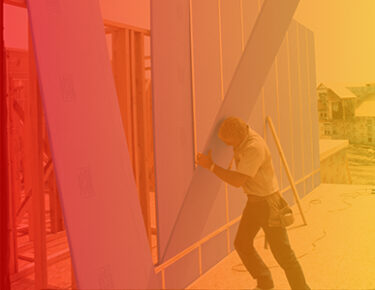 Panelization
Panelization
What is panelized construction
Gold Bond eXP Sheathing and PermaBASE Cement Board offer moisture-resistant options for panelized construction companies

Weather has always been the variable builders and contractors wish they could control. Reducing the weather’s effect on construction schedules is one of the main drivers of panelized construction. But building walls and even rooms in a factory has many benefits beyond weatherproofing the construction schedule.
This article will explore the different types of panelized construction, its benefits and the technical support provided by National Gypsum for panelized construction companies.
What’s the difference between stick-built and panelized construction?
Stick-built construction is the traditional method of building structures, whether they are framed with lumber or light-gauge steel. Workers cut and assemble lumber or steel into a frame on the jobsite, whether for a home, a hotel or an office building. This type of construction requires space for staging building materials, and if bad weather rolls in, work stops.
Panelized construction takes the framing work off the jobsite and moves it to a climate-controlled factory where teams engineer and build wall, floor and ceiling assemblies that are delivered to the work site on a truck later in the building process and assembled.
What is the difference between panelized construction, modular building and manufactured housing?
Building parts and pieces of homes, hotels and commercial buildings in a factory takes many forms. Here are the main differences between panelized, modular construction and manufactured housing.
- Panelized construction: Walls, floors and ceilings are designed and built in a factory and delivered to the work site, where they are assembled.
- Prefabricated or modular construction: Entire rooms, such as hotel bathrooms, are designed and built in a factory and delivered by truck to the work site, where they are installed in the structure.
- Manufactured housing: The entire structure, including interior drywall finishing, electrical and plumbing, windows and doors, and exterior cladding, is assembled in a factory, placed on a truck and delivered to the homesite.

What are the benefits of panelized construction?
Panelized construction has been around since the 1970s when builders and contractors of all types wanted to save money and compress construction schedules. Panelization benefits include:
- Fewer weather delays: Because the panels are constructed in a factory, they can be fabricated ahead of time and stored for delivery until the day they’re needed on the work site.
- Quality control: Precision, machine-cut framing pieces, plus the comfort of a climate-controlled workspace, result in better quality control and tighter tolerances.
- Labor savings: Panelized structures can be installed faster than site-built structures.
- Increased productivity: With assembly-line-style work, panels can be efficiently fabricated.

What types of buildings can be built with panelized construction?
Wood-framed single-family homes, multifamily townhomes, apartments and condominiums can all be built using panelized systems. Panels for these structures are generally open on the inside so electrical and plumbing can be added. Exterior finishes range from panels with only an exterior weather barrier and holes for windows to panels complete with windows and exterior cladding.
Light-gauge steel panels can be used to build anything from homes to midrise buildings. Light-gauge steel panels can be load bearing or non-load bearing depending on the design. Structures built with light-gauge steel panels include:
- Condominiums
- Townhomes
- Student housing
- Assisted living centers
- Hotels
- Storage facilities
How does National Gypsum support panelized construction companies?
National Gypsum’s 1-800-NATIONAL®Construction Services team provides technical insights and assistance for panelized builds. Additionally, technical guides available from National Gypsum give architects and contractors a head start on designs:
- The PURPLE Book®: A complete guide to fire-rated assemblies in commercial construction.
- The SoundBook®: The leading resource for technical details and sound-rated assembly drawings.
- The Wood Book™: A comprehensive guide to fire-rated assemblies in wood-frame construction.
Selected BIM and CAD details are also available for use on panelized projects.
Exterior products provided by National Gypsum provide enhanced weather resistance and energy efficiency for panelized construction projects.
Products include:
- Gold Bond® eXP® Sheathing
- Gold Bond® eXP® Fire-Shield® Sheathing
- PermaBASE® Cement Board
- PermaBASE CI® Insulated Cement Board
Learn how one panelized construction company uses Gold Bond eXP Sheathing with GridMarX® installation guide marks on light-gauge steel panels to ensure quality control during fabrication.
Be the first to hear of new NGConnects blog posts by subscribing here for early access.
Related Blog Posts

How GridMarX ensure quality control for a panelization business
Panel Systems, Inc. relies on Gold Bond eXP Sheathing with GridMa...
Read MoreRelated Podcasts

Episode 3: Key insights into area separation wall use and construction
From fireblocking and repairs to doors and plumbing, advance your...
Listen Now










